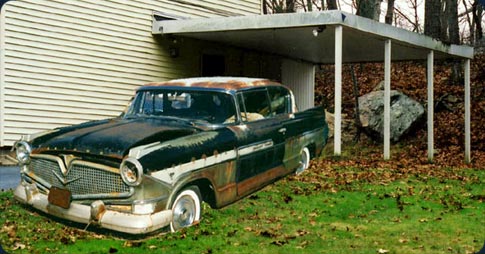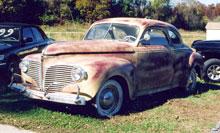I’ve long considered the 1941 Dodges attractive. My cousin Woody had a ’41 sedan that was a good-looking, if not exciting car. The 1942s were more striking, in a complex sort of way – almost Cadillac-like in the grille. But all that was lost after the war, with the eggcrate-faced D-24 models built from 1946 into 1949.
Chrysler Corporation’s all-new 1949 cars were late in coming. Not until March did they appear, by which time their advances seemed old hat, not just by comparison to Ford and GM but to the independents as well. They were designed by engineers, not stylists, for maximum interior room. Chrysler Corporation president K.T. Keller felt motorists needed not just headroom but hatroom. Although the bodies were narrower than the fender lines, they offered untold width – all the better for smoking. Brochures showed a fairly dated style of interior and touted ease of entry and exit.
In hindsight, the claim of “flashing pickup” seems ludicrous, and of course we know that Gyro-Matic didn’t shift automatically – your foot was an important part of the mechanism, but at least it did shift, which Dodge’s earlier Fluid Drive didn’t.
But at least Dodge offered some interesting models. The upscale Coronet had a woodie station wagon, convertible coupe and 8-passenger long-wheelbase sedan, in addition to the usual club coupe and four-doors. The entry-level Wayfarer was perhaps most innovative of all, with ChryCorp’s three-passenger business coupe, a bustle-backed two-door, and, most enigmatic of all, a true roadster. The roadster’s removable plastic side windows were unpopular, so later in the year vent windows and roll-up side windows were added.
If I were to covet a ’49 Dodge, I might seek out a Wayfarer roadster, perhaps one with a hemi. Or maybe the business coupe. On the other hand, I think I’d rather have a 1941 3-passenger coupe.

